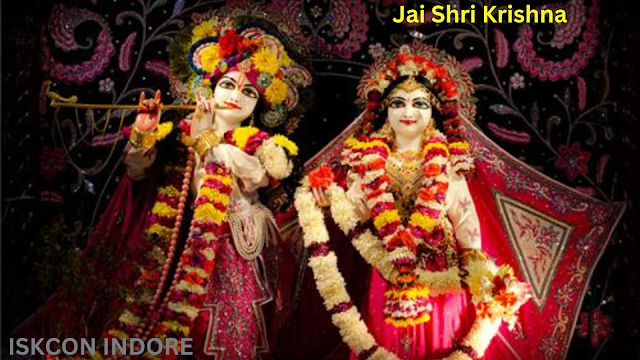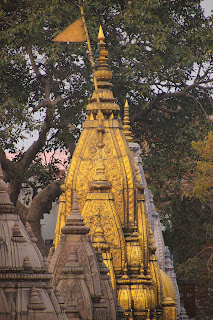What is ISKON and Why You Should Join It?
- ISKON is the International Society for Krishna Consciousness, a religious group that follows the teachings of Lord Krishna and the ancient Vedic texts.
- ISKON was formed by A.C. Bhaktivedanta Swami Prabhupada in 1966 in New York City to spread the message of the love of God and worldwide fraternity.
- ISKON followers conduct bhakti-yoga, or devotional service to Krishna, by chanting His holy names, reading His writings, adoring His deities, and helping His devotees.
- ISKON members also observe four regulative principles: no meat-eating, no drunkenness, no gambling, and no unlawful sex. These ideas assist people to cleanse their thoughts and bodies and to reach spiritual perfection.
- ISKON members get several privileges, such as
- Peace and happiness: By singing Hare Krishna, individuals feel inner delight and fulfillment and acquire a positive attitude.
- Knowledge and wisdom: By studying the Bhagavad-gita and other Vedic writings, people get a more excellent understanding of themselves, God, and the purpose of life.
- Community and friendship: By joining ISKON, individuals become part of a worldwide family of like-minded people who share their beliefs and encourage their spiritual progress.
- Service and contribution: By engaging in ISKON's many humanitarian and cultural programs, people positively influence the world and show their appreciation to God.
The History and Philosophy of ISKON: An Introduction
- ISKON is the International Society for Krishna Consciousness, a religious group that follows the teachings of Lord Krishna and the ancient Vedic scriptures¹.
- ISKON was formed in 1966 in New York City by A. C. Bhaktivedanta Swami Prabhupada, also known as Srila Prabhupada, the spiritual guru of ISKON².
- ISKON belongs to the Gaudiya Vaishnava tradition, a branch of Vaishnavism, the monotheistic worship of Krishna as the Supreme Personality of Godhead².
- ISKON's ideology is founded on the Bhagavad Gita and the Srimad Bhagavatam, the significant bhakti-yoga scriptures, or the yoga of devotion².
- ISKON's objective is to propagate the practice of bhakti-yoga to all people, regardless of their race, religion, or country, by singing the Hare Krishna mantra, studying the Vedic texts, adoring the deity forms of Krishna, and serving the devotees and humanity¹².
- ISKON's aim is to develop a God-centered society that is peaceful, happy, and successful, based on the principles of dharma (righteousness), karma (activity), and samsara (reincarnation)³.
The Benefits of Chanting Hare Krishna: A Scientific and Spiritual Perspective
- Chanting Hare Krishna is a kind of bhakti-yoga, or the yoga of devotion, which entails repeating the names of God with love and faith¹.
- The Hare Krishna mantra comprises three words: Hare, Krishna, and Rama. Hare refers to the holy force of God, Krishna signifies the all-attractive Lord, and Rama represents the greatest enjoyer².
- The Hare Krishna mantra is also known as the Maha Mantra, or the big mantra since it embodies the essence of all Vedic learning and offers all spiritual benefits.
- Chanting Hare Krishna has many scientific and spiritual benefits, such as:
- It dissolves terrible habits, evil thoughts, and negative emotions and helps eliminate fear, stress, and anxiety³.
- It purifies the mind and heart from all impurities and awakens the dormant love for God within the soul¹.
- It increases memory and concentration power and enhances cognitive abilities.
- It boosts the immune system and improves physical health and well-being.
- It elevates the consciousness from the material to the spiritual level and enables one to experience peace, joy, and bliss¹.
- It frees one from the cycle of birth and death and grants liberation from material existence.
- It connects one with the supreme personality of Godhead, Lord Krishna, who is the source of all happiness and beauty³.
ISKON and Social Service: How to Make a Difference in the World
- ISKON stands for the International Society for Krishna Consciousness, a religious group that follows the teachings of Lord Krishna and the ancient Vedic scriptures¹.
- ISKCON's founder, A.C. Bhaktivedanta Swami Prabhupada, highlighted the significance of social service as a manner of expressing love for God and all living beings.
- ISKON members participate in many social service activities, such as: - Distributing free vegetarian meals to the poor, particularly children, via programs like **Food for Life** and **ISKCON Daan Paatra**³¹.
- Providing education, health care, and vocational training to the needy, particularly in rural regions, via initiatives like **Bhaktivedanta Gurukula and International School** and **Bhaktivedanta Hospital** .
- Promoting environmental awareness and sustainability via projects like **Govardhan Ecovillage** and **Farming for Self-Sufficiency**. - Supporting disaster relief and humanitarian assistance through collaborations with organizations like the ISKCON Disaster Relief Fund** and the Bhumi Project** .
- ISKON's social service is built on the ideals of compassion, equality, and spirituality. It attempts to enhance all people's physical, mental, and spiritual well-being, regardless of their caste, creed, or religion².
The Festivals and Celebrations of ISKON: A Guide for Beginners
- ISKON stands for the International Society for Krishna Consciousness, a religious group that follows the teachings of Lord Krishna and the ancient Vedic scriptures¹.
- ISKON celebrates various festivals throughout the year, based on the lunar calendar and the pastimes of Lord Krishna and His devotees².
Some of the essential festivals of ISKON are:
Ratha Yatra: The festival of chariots, which celebrates the homecoming of Lord Jagannath (Krishna), Baladeva (His brother), and Subhadra (His sister) to Vrindavan, their childhood residence. Devotees pull enormous chariots bearing the deities in a magnificent procession²⁴.
Janmashtami: The appearance day of Lord Krishna, which is celebrated with fasting, singing, dancing, and providing a midnight feast to the Lord²³.
Diwali: The festival of lights, which honors the triumph of Lord Rama over the evil king Ravana and His return to Ayodhya after 14 years of exile. Devotees burn lights and candles to welcome the Lord and His consort Sita²⁵.
Gaura Purnima: The manifestation day of Lord Chaitanya Mahaprabhu, who is viewed as the most compassionate incarnation of Lord Krishna in this era. He taught the singing of the Hare Krishna mantra as the simplest and most magnificent technique of reaching love of God² .
Radhashtami: The appearance day of Srimati Radharani, who is the everlasting partner and the highest devotee of Lord Krishna. She is venerated as the embodiment of pure love and devotion² .
ISKON's festivals are full of pleasure, dedication, and transcendental entertainment. They give a chance to interact with God and His followers, to learn about the Vedic culture and philosophy, and to experience spiritual bliss².
ISKON and Vegetarianism: The Ethical and Health Reasons
ISKON's vegetarianism provides several ethical and health advantages, such as:
- It eliminates animal suffering and cruelty and supports animal welfare and rights2.
- It preserves the environment and natural resources and prevents ecological degradation and climate change2.
It promotes human health and well-being and avoids many chronic illnesses and disorders2. It develops spiritual consciousness and enlightenment and helps to accomplish self-purification and freedom.
The Art and Culture of ISKON: A Showcase of Beauty and Devotion
- ISKON has a solid and active creative culture, which reflects its origins in the Gaudiya Vaishnava tradition, a branch of Hinduism that worships Krishna as the highest Lord².
- ISKON's art and culture comprise many kinds of expression, including fine arts, theatre, dance, music, film, literature, and architecture. These forms are utilized to honor Krishna and His disciples, to depict the Vedic philosophy and history, and to attract the public and patrons of arts¹.
Some examples of ISKCON's art and culture are:
- Fine arts: ISKON painters have produced hundreds of unique paintings picturing Krishna and His spiritual dwelling. With their distinctive combination of Eastern and Western styles, these pieces of art illustrate several volumes of literature, embellish ISKON temples, and assist to visually portray the Krishna tradition¹.
- Theatre: ISKON believers stage plays based on the tales from the scriptures, such as the Ramayana and the Krishna Lila. They employ costumes, props, puppets, martial arts, and special effects to produce compelling and inspirational shows¹.
- Dance: ISKON believers practice and teach ancient Indian dance styles, such as Bharata Natyam, Kathak, and Odissi. They also perform traditional dances, including as Garba, Bhangra, and Dandiya. These dances are a manner of showing love to Krishna via elegant movements and gestures¹.
- Music: ISKON adherents sing and perform different instruments, such as harmonium, mridanga, kartalas, flute, sitar, guitar, and keyboard. They recite the Hare Krishna mantra, which is considered the most potent sound vibration for awakening love of God. They also create and sing songs based on the Vedic hymns and poems¹.
- Cinema: ISKON devotees make films and documentaries that portray the life and teachings of Krishna and His followers. They also showcase the activities and accomplishments of ISKON across the globe. Some of these films have received honors at international festivals¹.
- Literature: ISKON followers publish books and articles that share the Vedic knowledge and culture in a clear and approachable manner. They also issue publications and newsletters that highlight the news and activities of ISKON. They also translate and disseminate the original writings of Srila Prabhupada, the founder of ISKON¹.
- Architecture: ISKON believers create temples and villages that are influenced by the traditional and neo-Vedic forms. These constructions are meant to generate a spiritual ambiance and to encourage worship and service. Some of these temples are regarded architectural wonders by experts¹.
ISKON and Interfaith Dialogue: How to Promote Harmony and Understanding
- ISKON regards conversation between its members and persons of other religions as a chance to listen to others, establish mutual understanding and trust, and share our dedication and faith with others while respecting their devotion to their religion.
- ISKON understands that no one religion monopolizes the truth, the revelation of God, or our connection with God. ISKON's members are urged to be courteous to persons of religion from other traditions and to recognize the necessity for people of various faiths to work together for the good of society and glorify God.
- ISKON emphasizes the obligation of each person to cultivate his or her connection with the Supreme Lord.
- ISKON has a lively and dynamic interfaith culture, which reflects its origins in the Gaudiya Vaishnava tradition, a branch of Hinduism that worships Krishna as the highest Lord².
- ISKON's interfaith efforts encompass many types of participation, such as conferences and symposia, exchanging monastic people, co-operating in humanitarian and cultural initiatives, and publishing joint pronouncements on moral and political issues.
- ISKON's interfaith conversation is built on the ideals of compassion, equality, and spirituality. It attempts to enhance all people's physical, mental, and spiritual well-being, regardless of their caste, creed, or religion².
ISKON is the International Society for Krishna Consciousness, a Hindu religious group that follows the teachings of Lord Krishna and the ancient Vedic texts. ISKON was formed in 1966 in New York City by A. C. Bhaktivedanta Swami Prabhupada, also known as Srila Prabhupada, the spiritual teacher of ISKON. ISKON’s members practice bhakti-yoga, or the yoga of devotion, by singing the Hare Krishna mantra, studying the Vedic texts, adoring the deity forms of Krishna, and serving the devotees and mankind. ISKON has a solid and active culture encompassing many types of art, music, dance, literature, and architecture. ISKON also works in numerous social service and interfaith programs to promote peace, harmony, and spirituality throughout the globe.










0 Comments